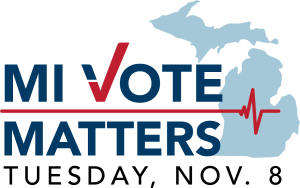
 The upcoming general election will set the stage for critical healthcare decisions for Michigan and the nation in the years ahead. In November, Michigan voters will help elect the next governor, attorney general and secretary of state of Michigan, decide who will represent the state in all 13 Michigan seats in the U.S. House of Representatives, plus cast ballots for all 110 seats of the Michigan House of Representatives and 38 seats of the Michigan Senate, among other contests.
The upcoming general election will set the stage for critical healthcare decisions for Michigan and the nation in the years ahead. In November, Michigan voters will help elect the next governor, attorney general and secretary of state of Michigan, decide who will represent the state in all 13 Michigan seats in the U.S. House of Representatives, plus cast ballots for all 110 seats of the Michigan House of Representatives and 38 seats of the Michigan Senate, among other contests.
The MI Vote Matters campaign seeks to encourage voters to engage in the election and elect candidates who value healthcare and the needs of patients, urging hospital staff members, volunteers, patients, visitors and others to vote Nov. 8. As part of the MI Vote Matters campaign, the MHA has prepared the following informational resources for members.
- MI Vote Matters informational posters geared toward patients, families, visitors and staff. Available in three sizes, each poster is laminated and can be affixed behind any plastic or plexiglass barrier.
- The 2022 MHA Candidate Guide, a list of all candidates by office and district.
A packet containing samples of these resources will be mailed the week of Sept. 12 to members of the MHA’s Hospital Affiliated Legislative Officers committee, as well as public relations executives at MHA-member organizations. During the course of the election season, complimentary copies of the materials will be available to MHA members by request through an online order form. Questions about materials may be directed to the MHA by emailing election@mha.org or calling (517) 703-8601.
In addition, the MHA MI Vote Matters 2022 election webpage has been activated and will be updated with the latest information about the election, including a list of the proposals on this year’s statewide ballot. Members are encouraged to use #MIVoteMatters to join the election 2022 conversation on social media.
MHA members are also encouraged to contact candidates and notify the MHA if a particular candidate could be considered a healthcare champion by supporting healthcare and hospitals. Members with feedback or questions should contact Laura Appel at the MHA.


